How to Get Rid of Squirrels in Your Garden: 14 Ways
-
Pete Ortiz
- Last updated:
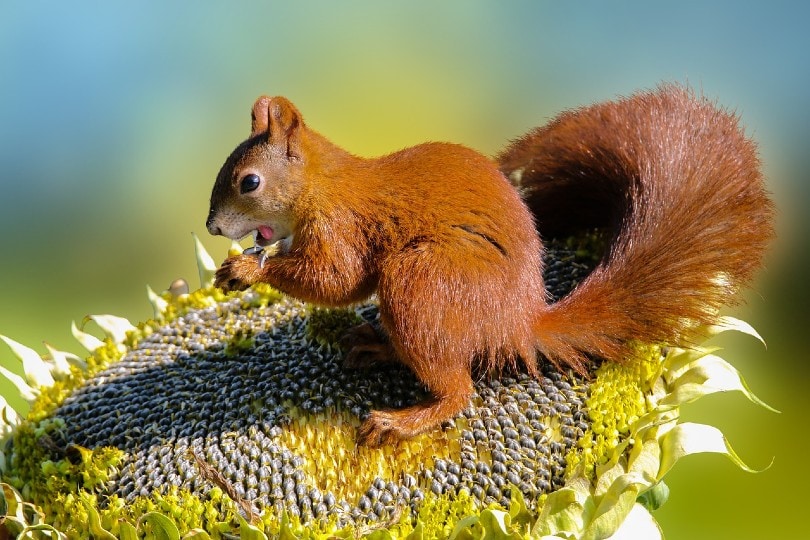
It’s weird how we put up with squirrels. Maybe it’s their size, those big eyes, or their playful nature, but whatever the reason, we have a hard time treating them like any other pest. Unless they’re crawling through the pantry, some people even enjoy the sight of these critters running around their yard.
Those sentiments change in an instant once you start a garden. Relative cuteness aside, squirrels are as detrimental to the property as any insect. You’ll see they can make quick work of digging up your favorite garden bulbs, ruining your flowers, and devouring your veggies.
If you desperately need relief from these pesky rodents, check out these 14 methods to get rid of squirrels in your garden.
The 14 Ways to Get Rid of Squirrels in Your Garden
1. Use Off-Putting Herbs and Spices
Strong odors and flavors can affect a squirrel’s delicate senses and make them think twice about messing with your garden. In general, any powerful spice can have an effect. Try sprinkling these common cooking ingredients over your plants to keep squirrels away:
- Cayenne pepper
- Red pepper flakes
- Paprika
- Cajun seasoning
- Cinnamon
- White or black pepper
Avoid sprinkling these directly on your fruits and veggies. If you feel the need, you can try putting spices on a few pieces to give any squirrels an unpleasant surprise if they try to eat them.
Capsaicin is an excellent squirrel repellent in the backyard. While the spicy component affects mammals, it does not impact birds, so it makes a perfect birdseed additive if you have issues around the feeder.
You’ll need to reapply these fixes frequently to keep squirrels away, especially after it rains. Try mixing up your spices if one doesn’t seem to be having much effect. Consumer squirrel repellent sprays and other treatments are also available, many incorporating common herbs and spices as active ingredients.
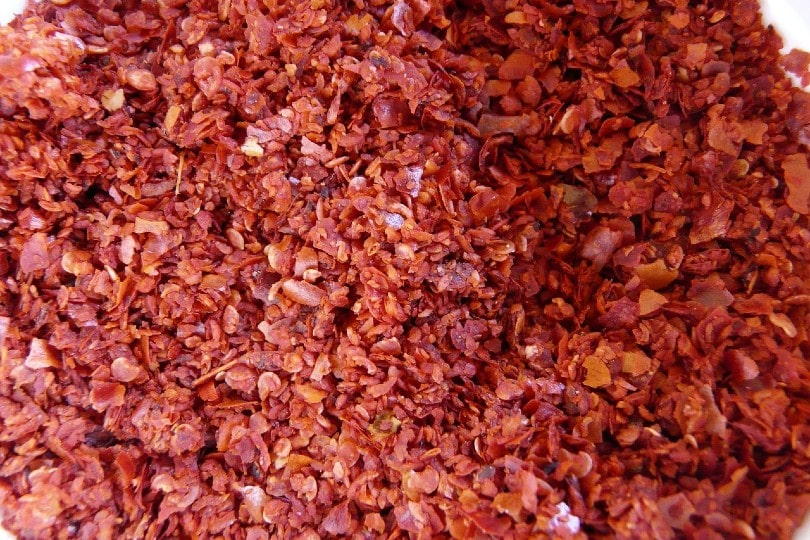
2. Plant Mint
Speaking of herbs, minty plants can work as well as spices when you need to keep squirrels out of the garden. Peppermint is easy to grow and can make an effective barrier when planted around garden edges. It spreads rapidly, so try to maintain a close eye on its growth patterns or keep it in containers. Be mindful of your pets around the plants, as they can be toxic to dogs if eaten in excess.
3. Sprinkle Coffee Grounds
Try recycling old coffee grounds to keep squirrels at bay. New or used, coffee emits an aroma that may be tempting to sleepy humans but extremely off-putting to squirrels and other mammals.
Coffee grounds give you dual benefits of preventing squirrels and adding nutrients to your soil. Like many other preventative applications, you’ll need to replenish them regularly. They also have limited effectiveness and generally work best as part of a multi-pronged defensive effort.
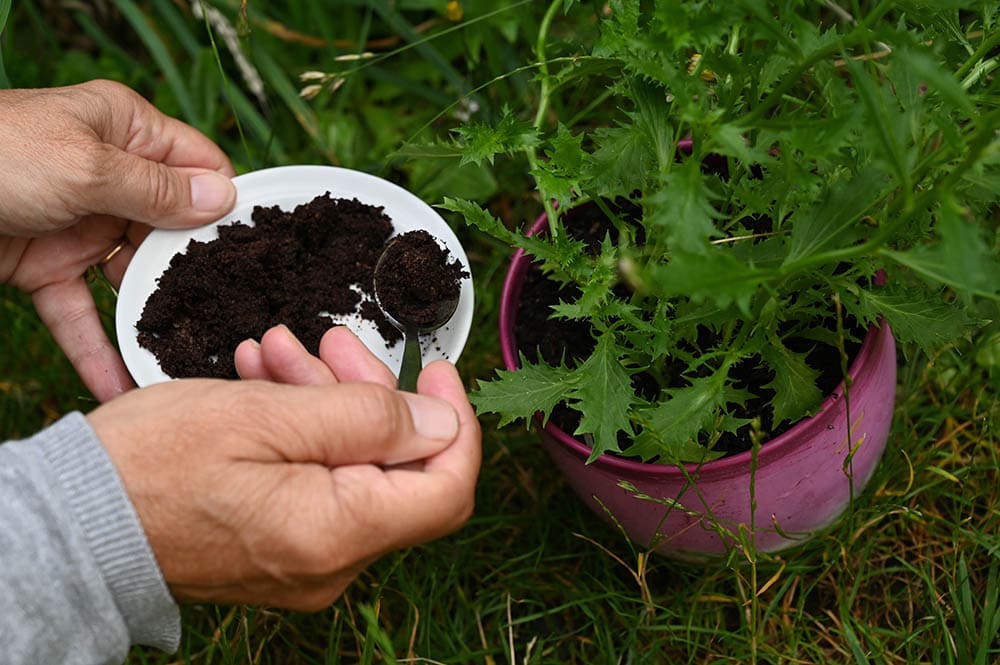
4. Let the Dog Out
If you don’t like the upkeep of squirrel repellents around your plants, you can make life a little easier by letting your pets out to roam the yard. Dogs and cats love chasing squirrels. It offers excellent exercise for them and less work for you. Plus, it can be highly effective when combined with other preventative measures.
When your dogs aren’t out chasing squirrels, you can still use them to prevent squirrels in other ways. If your dog sheds, take some of their hair and sprinkle it around your garden beds. Squirrels will catch wind of a threat and stay away from your plants. Human hair also works well in this regard, and it has the additional benefit of helping to prevent slugs.
5. Use Squirrel-Proof Feeders
Squirrels are some of nature’s most spectacular acrobats. They have no problem crawling, dangling, or jumping to reach a seed-filled tray, completely ruining your efforts to attract more appealing wildlife.
Keep squirrels away from feeders by attaching them to poles spaced at least 8 feet from poles, trees, and other structures. Elevate the feeder at least 5 feet off the ground, and attach an inverted cone-shaped baffle to the pole to block squirrels from climbing up. You can also try greasing the pole so the squirrels can’t get a grip.
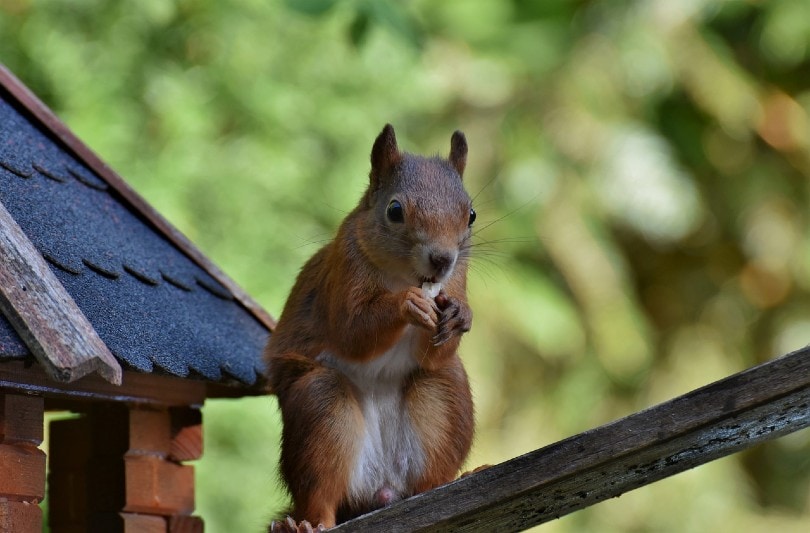
6. Plant Squirrel-Repelling Flowers
Flowers are favorite targets for squirrels. They’ll dig up and eat bulbs or plow through blooming blossoms for the simple fun of it. If rampant destruction is a frequent problem in your garden, you can get proactive by planting squirrel-repellent flowers, including:
- Daffodils
- Alliums
- Hyacinths
- Snowdrops
- Fritillaria
- Marigolds
- Scilla
Squirrels are the most active in late summer and early fall as they build their food supply for the winter. If you have a bulb that squirrels are constantly digging up, try planting a little later in the fall season when they have likely stocked up.
7. Set Up a Fake Owl
Squirrels know well enough to stay away from natural predators, and installing a decoy owl can be a useful deterrent in some instances. It may not make the most attractive lawn ornament, but it doesn’t need to be conspicuous to be effective. As long as the squirrels see it, you can keep it hidden from plain view. Be sure to regularly move your “scare-squirrel” to a new perch to keep them from getting too comfortable with it.
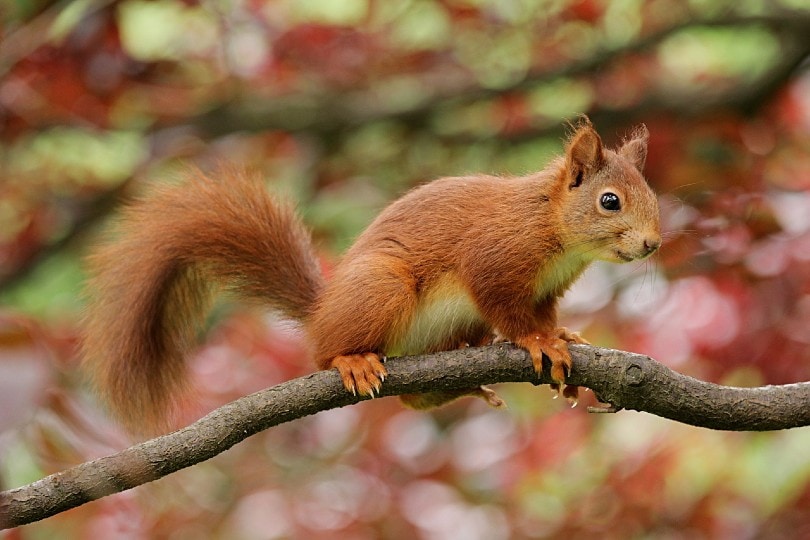
8. Invite Real Owls to the Garden
When the fake owl stops working, try upgrading to the real thing, as long as you don’t keep chickens, small dogs, or other potential prey around the backyard. Owls strike legitimate fear into the hearts of squirrels and other would-be pests, and if you can keep them around, you could see your problem disappear.
Put up nesting boxes to give any nearby owls a comfortable home. Raise them about 10 feet from the ground, and position them near the edges of your property to keep owl droppings from becoming a common obstacle. Give your new sentries a few branches to sit on, and keep your backyard lights off to let them do their nightly hunting.
9. Use Predator Scents
Squirrels have numerous predators, and you don’t always have to attract them to your lawn to make good use of them. Garden centers and online stores sell wolf, fox, and coyote urine for warding off rodents, chipmunks, deer, and other plant-eating nuisances.
Spray the scent around your garden and reapply as needed if squirrels return. Predator urine can last a surprisingly long time, but it can easily wash away in the rain.
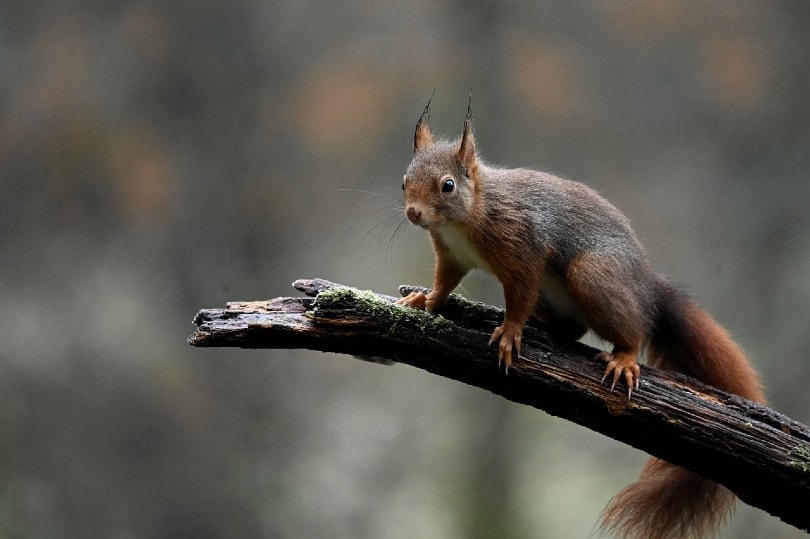
10. Set Up Fencing or Netting
Fencing and netting is the most effective way to get rid of squirrels in your garden. They can overcome bad smells and get wise to fake owls, but even the smartest squirrel can’t get past a physical barrier. Cover your containers and garden beds to protect freshly planted bulbs, or create caged constructions to keep your veggies safe during the growing season.
Squirrels can fit through holes as small as 1.5 inches in diameter, so plan accordingly when picking out your mesh cover. When making fencing, be sure to bury it at least 6 inches deep to keep squirrels from tunneling underneath.
11. Fill Containers and Beds with Stones
Mulching with rough gravel can dissuade squirrels from digging in your containers. Plant your bulbs, and leave a layer of heavy stones, sharp rocks, or crushed shells over the top of the soil.
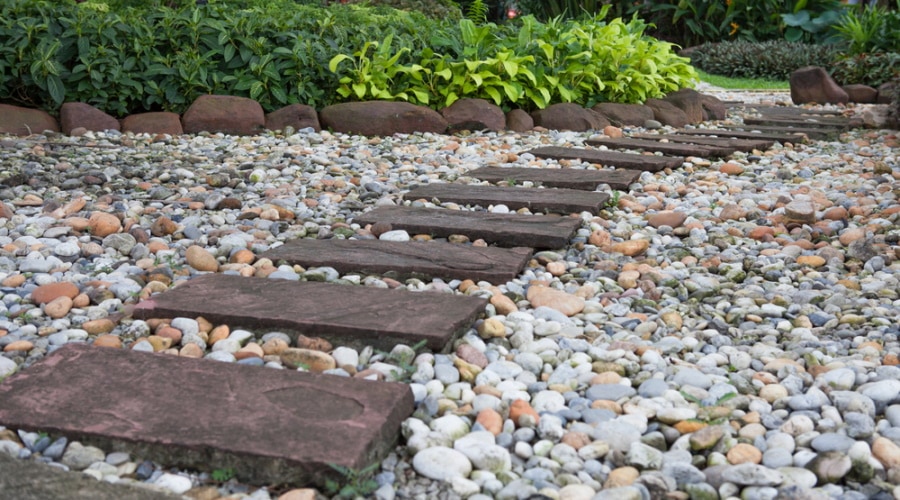
12. Manage Your Trees
Trees provide efficient routes into and around your property, and by managing them, you can cut off access to your garden. Trim back limbs so squirrels can’t jump to bird feeders and get rid of any trees that don’t need to be there. Removing limbs hanging over your house can also keep squirrels from invading your attic.
If you don’t want to cut down your trees, you may be able to take them out of the equation by wrapping the trunks so squirrels can’t climb them. You can buy smooth metal sleeves to put around the tree or make a DIY baffle to block squirrels from climbing.
13. Clean Up the Yard
Prevention is the best way to keep squirrel problems in check, and it starts with removing any reason to come into your garden in the first place. Pick up debris from under bird feeders and around your garden regularly. Autumn leaves and fallen fruit provide shelter and food for all kinds of pests, so keeping it raked and tidy will help prevent squirrels and other assorted threats.
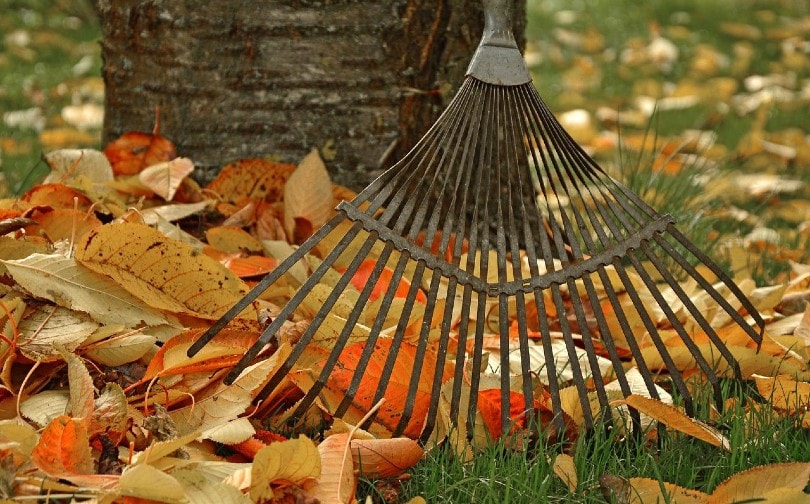
14. Avoid Ineffective Removal Methods
There are countless other ways to make life hard on squirrels, but they can also create new challenges for you. A “sacrifice garden” to distract squirrels often invites more to your yard, and traps only create more problems to solve once you catch one. Meanwhile, new-fangled concepts like motion-detecting water sprayers and ultrasonic dischargers often don’t work.
Final Thoughts
The rules for keeping squirrels away from the garden are simple: don’t feed them, stay vigilant for damage, and be proactive to prevent attacks on your garden.
Squirrels are relatively intelligent. That’s unfortunate in some ways because they can find clever ways to harass you, but it’s also helpful because it means they can recognize a lost cause. Follow these tips to get rid of squirrels in your garden, and they’ll quickly take the hint and move on.
Featured Image Credit: blende12, Pixabay
Contents



